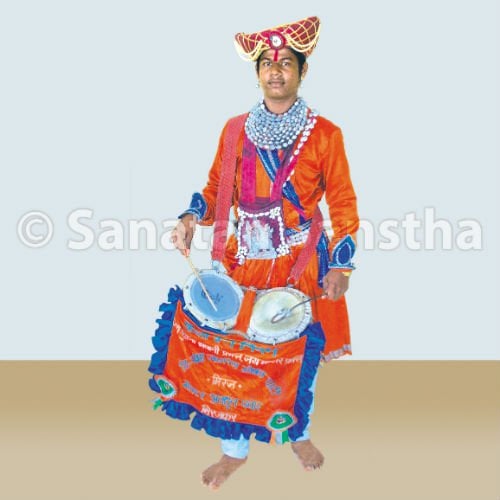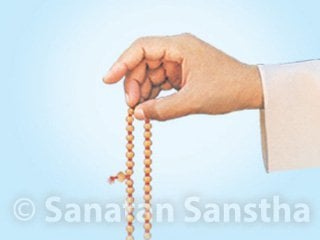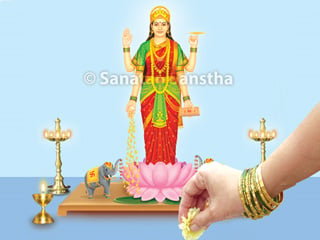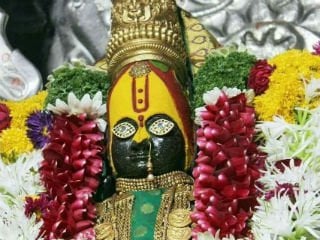
1. Objectives of performing Gondhal for the Goddess
In order to reduce the suffering of other family members, caused by negative energies, the Goddess is awakened with a loud sound and is invoked to undertake Her mission of destruction. ‘Gondhal’ is performed as a remedy to the suffering caused by age old spiritual defects in the premises and also to terminate distress caused by negative energies, continuing for generations.
2. Effects of performing Gondhal
While performing the gondhal, there is generation of a loud sound from Tej and Shakti waves get attracted to this sound. This restricts the movements of the negative energies within the premises and many of them are destroyed in a short time. Thus, the benefit of the Shakti waves lasts for a longer period. Since during Navratri the Shaktitattva associated with Tej is active, if gondhal is performed for the Goddess on these days, benefits are more compared with other days.
3. Gondhali (Worshippers of the Goddess)
These embodied souls are included in the devotees of the Devitattva, because for generations they have been worshipping Her as tradition. They are also termed as ‘messengers in the form of Shakti’ or ‘servitors’. Using their powerful energy-laden speech, they invoke the Goddess and are able to awaken Her marak form. If the bhav of the individual dancing the gondhal is 30%, then at the spiritual plane it receives Chaitanya to the extent of 30%. If the bhav is high and ego is less, then the benefit can be as high as 50%. Action devoid of bhav gives a benefit of only 10%.
4. Undertaking spiritual practice is more important than gondhal
Participation in the gondhal as a duty, to preserve the family tradition carries only 10% importance. On the other hand, going beyond such duties and fulfilling the religious duty of performing sādhanā by chanting the Name of the Kuladēvatā (Family Deity) carries 30% importance.
5. What is the science behind the ritual of ‘jogva magne’ ?
Meaning : Jogva means beckoning the Goddess with an earnest, wholehearted prayer and pleading before Her to fulfill one’s wish. Jogva is an earnest prayer made unto the Holy feet of the Goddess.This pleading symbolises a decrease in the ego of the embodied soul and is directed towards merging the Goddess principle from within. It is a self-motivated surrender unto the Holy feet of the Goddess.
Dasyabhakti (A form of worship as a servitor) : Jogva magne is a form of worship as a servitor. The true form of this worship is partaking of food cooked from alms of ingredients like flour, salt, etc. obtained by asking for alms from five households, as a servitor of the Goddess. This act not only reduces the ego but also helps in developing detachment. This is the true form of worship of Jogva.
Importance : ‘The ritual of jogva magne helps one to detach oneself from the Great Illusion and become a servitor of the Energy principle. This act amounts to taking assistance from the manifest form, to reduce one’s ego and to experience detachment in that unmanifest form.’ – Pujya (Mrs.) Anjali Gadgil
Reference : Sanatan’s Holy Text, ‘Science underlying rituals related to worship of the Goddess‘

 Ganga – Shakti in the form of rivers
Ganga – Shakti in the form of rivers Why do we chant Name of Kuladevi instead of Kuladev?
Why do we chant Name of Kuladevi instead of Kuladev? What are the different types of Shaktis?
What are the different types of Shaktis? Shri Lakshmi – Deity of opulence
Shri Lakshmi – Deity of opulence Ritualistic worship of Devis
Ritualistic worship of Devis